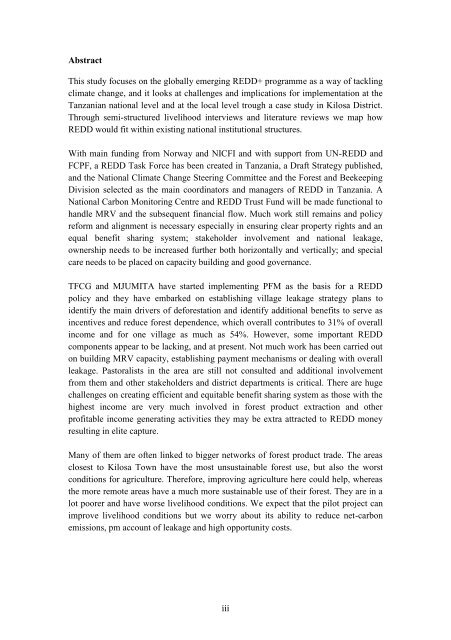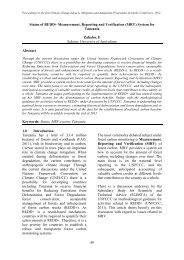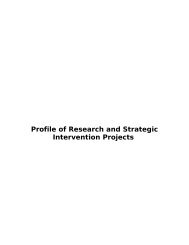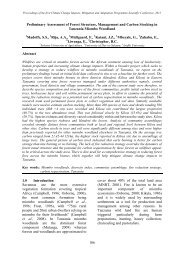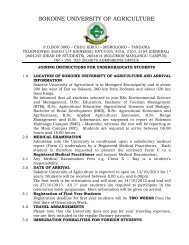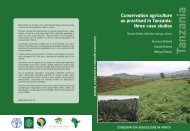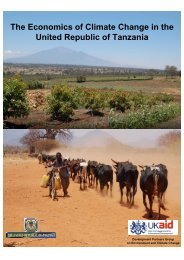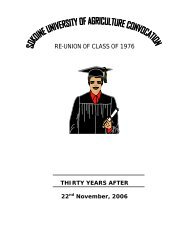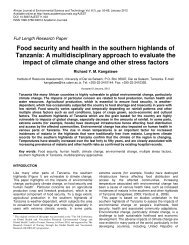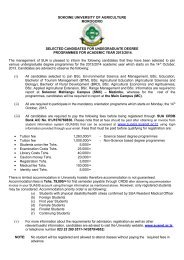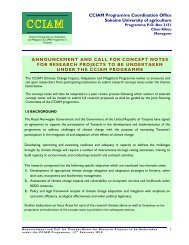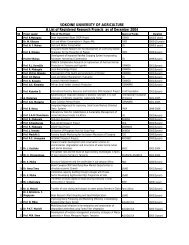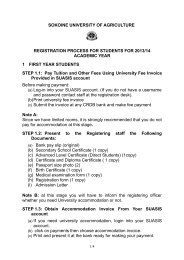- Page 2 and 3: (NOT) A REDD LIGHT DISTRICT?REDD po
- Page 4: DECLARATIONWe, Cecilie Dyngeland an
- Page 10: Key terms:Reduced Emissions from De
- Page 13 and 14: 4.1 POPULATION 724.2 VEGETATION, WI
- Page 16 and 17: List of FiguresFigure 1: Map over T
- Page 18 and 19: Table 34: Total household income an
- Page 20 and 21: PFMPFRAPMO-RALGPRAREDDR-PINRRASLASU
- Page 22 and 23: As a result, the concept of Reduced
- Page 24 and 25: 1.2 BackgroundTanzania, which is lo
- Page 26 and 27: even in comparison with the rest of
- Page 28 and 29: Table 2: Forest loss divided by for
- Page 30 and 31: The three main objectives of PFM in
- Page 32 and 33: crucial role of reducing emission f
- Page 34 and 35: 1.2.4 REDD in TanzaniaCurrently, Ta
- Page 36 and 37: To sum up, together with Tanzania
- Page 38 and 39: empirically in relationship to our
- Page 40 and 41: CHAPTER TWO - THEORETICAL APPROACHE
- Page 42 and 43: introduce new technologies such as
- Page 44 and 45: 2.1.3 Resource regimeThe regime con
- Page 46 and 47: suitable for different social setti
- Page 48 and 49: Political actors; preferences,actio
- Page 50 and 51: Effectiveness, refers to the extent
- Page 52 and 53: Chambers 3 , who was a prominent cr
- Page 54 and 55: Figure 4: The Livelihood FrameworkS
- Page 56 and 57: Poverty reduction - Forest products
- Page 58 and 59:
Table 3: The progress for theoretic
- Page 60 and 61:
2.3.1. REDD on a global levelOn an
- Page 62 and 63:
degree of influence and power betwe
- Page 64 and 65:
The arguments for this option is it
- Page 66 and 67:
egulations, prohibitions and rights
- Page 68 and 69:
forest (Vatn and Vedeld 2011). How
- Page 70 and 71:
When looking at economical actors t
- Page 72 and 73:
Table 4: Modified design principles
- Page 74 and 75:
administrative boundaries. She furt
- Page 76 and 77:
CHAPTER THREE - METHODSIn this chap
- Page 78 and 79:
impact of that technology has been
- Page 80 and 81:
Appraisal (RRA) that derived from r
- Page 82 and 83:
active use of focus group discussio
- Page 84 and 85:
3.4.1 Calculation of incomesAccordi
- Page 86 and 87:
eaches you, and it can also cause f
- Page 88 and 89:
picture as close to reality as poss
- Page 90 and 91:
CHAPTER FOUR - LOCAL STUDY AREAAs o
- Page 92 and 93:
The topography of the district vari
- Page 94 and 95:
year to year, falling in two period
- Page 96 and 97:
2006/2007 Kilosa District had to im
- Page 98 and 99:
where it is not established whether
- Page 100 and 101:
the unsustainable use of Kilosas fo
- Page 102 and 103:
the District Committee in 2009 evic
- Page 104 and 105:
CHAPTER FIVE - TANZANIA NATIONAL ST
- Page 106 and 107:
5.2 Office of the Vice-PresidentThe
- Page 108 and 109:
Figure 7: Institutional Arrangement
- Page 110 and 111:
Table 5: Budget summary for ministr
- Page 112 and 113:
it also encourages local participat
- Page 114 and 115:
those districts having LAFRs it oft
- Page 116 and 117:
The only real difference in the pro
- Page 118 and 119:
In order to get the clearest pictur
- Page 120 and 121:
in their respective areas of jurisd
- Page 122 and 123:
encompass at least one-fourth of fe
- Page 124 and 125:
This land falls under state propert
- Page 126 and 127:
However, PFM places great emphasis
- Page 128 and 129:
Table 7: Kilosa District Department
- Page 130 and 131:
must do is apply the District Counc
- Page 132 and 133:
By this we can identify the institu
- Page 134 and 135:
From the start, it was important to
- Page 136 and 137:
The REDD Task force and the REDD in
- Page 138 and 139:
6.1.1.3 Stakeholder analysisThe dif
- Page 140 and 141:
these officers work with are primar
- Page 142 and 143:
Global networks are not necessarily
- Page 144 and 145:
Table 9: Various stakeholders’ in
- Page 146 and 147:
solution. In the last section of a
- Page 148 and 149:
In the analytical phase, we then ha
- Page 150 and 151:
1. REDD institutional arrangements
- Page 152 and 153:
To ensure a secure land tenure syst
- Page 154 and 155:
Republic of Tanzania 2010). In 2009
- Page 156 and 157:
6.1.3.2 Pilot projectsFrom the star
- Page 158 and 159:
Figure 13: Map over REDD+ Pilot Pro
- Page 160 and 161:
supportive projects and programmes
- Page 162 and 163:
approach to conservation, and a Eas
- Page 164 and 165:
concerns are; corruption, poor inte
- Page 166 and 167:
activities. In this sense, it will
- Page 168 and 169:
For a while there has been on-going
- Page 170 and 171:
where at the district and ward leve
- Page 172 and 173:
As mentioned, Tanzania came out wit
- Page 174 and 175:
that they with a draft strategy wil
- Page 176 and 177:
and societal actors” (Berger 2003
- Page 178 and 179:
2010). So far, the TF has been gett
- Page 180 and 181:
(remote) communities and help creat
- Page 182 and 183:
ules and regulations in place and c
- Page 184 and 185:
most likely pose new challenges. Th
- Page 186 and 187:
money in a competent way. For insta
- Page 188 and 189:
Embassy is working together with ot
- Page 190 and 191:
people which come from outside thes
- Page 192 and 193:
Table 13: Socio-economic factors by
- Page 194 and 195:
Figure 16: Level of worker/consumer
- Page 196 and 197:
As seen, there are substantial vari
- Page 198 and 199:
Here we see that it is still the ho
- Page 200 and 201:
Another interesting finding is that
- Page 202 and 203:
N = 180, * indicates significantly
- Page 204 and 205:
Most people consider their village
- Page 206 and 207:
households in the study area. Howev
- Page 208 and 209:
might think that more wealthy house
- Page 210 and 211:
some timber being transported by bi
- Page 212 and 213:
7.2.3 Non-farm activitiesIn the stu
- Page 214 and 215:
7.5 OutcomesOut from the access to
- Page 216 and 217:
7.5.1 Agricultural incomeOverall, a
- Page 218 and 219:
7.5.2 Environmental incomeWithin th
- Page 220 and 221:
Table 40: Forest environmental inco
- Page 222 and 223:
highest returns from them, they are
- Page 224 and 225:
Table 41: How well-off households p
- Page 226 and 227:
30.0025.0020.0015.0010.005.000.00Fi
- Page 228 and 229:
Lunenzi had bigger households than
- Page 230 and 231:
Table 45: Socio-economic factors to
- Page 232 and 233:
management authority of the Village
- Page 234 and 235:
living in the village, and rather t
- Page 236 and 237:
for a higher price. A common compla
- Page 238 and 239:
CHAPTER EIGHT - EVALUATION OF TFCG
- Page 240 and 241:
conservation, and the development o
- Page 242 and 243:
experience with the two districts,
- Page 244 and 245:
8.2.1 Project ProgressAfter roughly
- Page 246 and 247:
Following this line of thought, the
- Page 248 and 249:
Agricultural and Livestock Office a
- Page 250 and 251:
Table 48: Awareness of project by t
- Page 252 and 253:
we encountered as well, and whereas
- Page 254 and 255:
the ones most willing to not cultiv
- Page 256 and 257:
8.2.2.2.2 Management authority unde
- Page 258 and 259:
management responsibility which als
- Page 260 and 261:
levels had increased after Masugu j
- Page 262 and 263:
Overall, the level of participation
- Page 264 and 265:
they might then be able to substitu
- Page 266 and 267:
758865Nyali Lunenzi Masugu Lumango
- Page 268 and 269:
Lumango scores lower than both Lune
- Page 270 and 271:
Table 58: Experiences from PFM in T
- Page 272 and 273:
8.4.1 ParticipationThe first challe
- Page 274 and 275:
REDD is fully implemented and if be
- Page 276 and 277:
occur as a result of REDD, some iss
- Page 278 and 279:
and establish a monitoring system t
- Page 280 and 281:
financing carbon co-operative based
- Page 282 and 283:
8.45 Monitoring, Reporting and Veri
- Page 284 and 285:
The bigger the forest, the more inc
- Page 286 and 287:
on forest conservation and environm
- Page 288 and 289:
thus reduce the need of having to c
- Page 290 and 291:
we will now discuss as a factor whi
- Page 292 and 293:
8.5 Concluding remarks and overall
- Page 294 and 295:
quarrels with Maasai pastoralists w
- Page 296 and 297:
unsustainable forest use, thus maki
- Page 298 and 299:
As a final summarising point we put
- Page 300 and 301:
CHAPTER NINE - CONCLUSION ANDRECOMM
- Page 302 and 303:
What we found, was a somewhat “ov
- Page 304 and 305:
handle within a REDD project. Eithe
- Page 306 and 307:
286
- Page 308 and 309:
Benjaminsen, T. A., F. P. Maganga,
- Page 310 and 311:
Cotula, L. (2009). Land grab or dev
- Page 312 and 313:
Hydén, G. (2006). "Beyond Governan
- Page 314 and 315:
Ministry of Natural Resources and T
- Page 316 and 317:
Prime Ministers Office and Regional
- Page 318 and 319:
The REDD Desk (2011). "The REDD+ Ta
- Page 320 and 321:
Vatn, A. and P. Vedeld (2011). Gett
- Page 322:
APPENDIXAppendix 1: Village Sketch
- Page 327 and 328:
Appendix 2: Questionnaire for the h
- Page 329 and 330:
A16What is the most important sourc
- Page 331 and 332:
assessing the local livelihood outc
- Page 333 and 334:
B9. How do you feed your livestock
- Page 335 and 336:
B16a. If „bad‟ or „very bad
- Page 337 and 338:
e dealt with in the PRA interviews.
- Page 339 and 340:
1 My/our interests are not taken in
- Page 341 and 342:
2 Clear boundaries/outsiders are ke
- Page 343 and 344:
them always them mostly follow them
- Page 345 and 346:
C35a. If „somewhat dissatisfied
- Page 347 and 348:
9 Creates opportunities for corrupt
- Page 349 and 350:
D4. How satisfied are you with thes
- Page 351 and 352:
SECTION E: Pre-REDD AnalysisThe aim
- Page 353:
Appendix 3: List of IntervieweesNam


